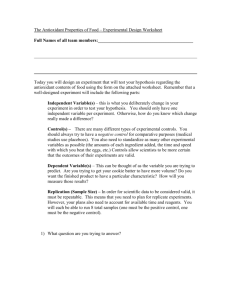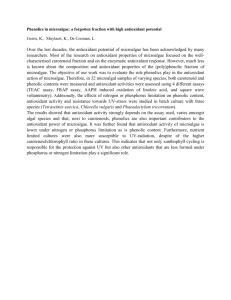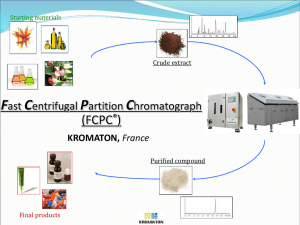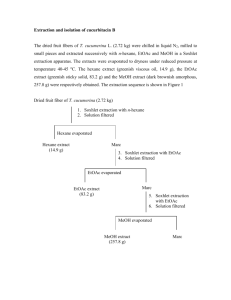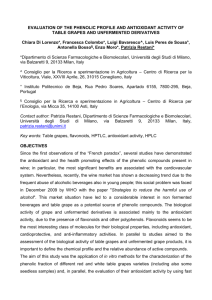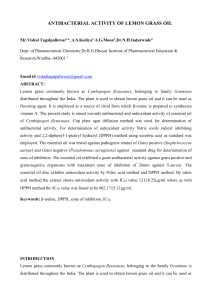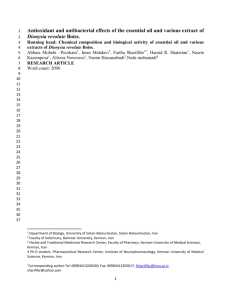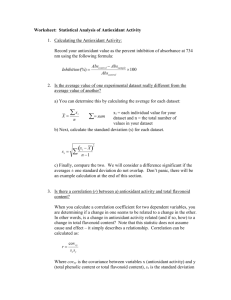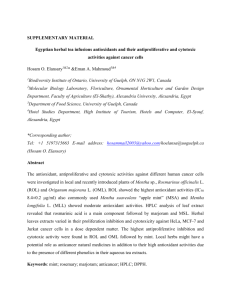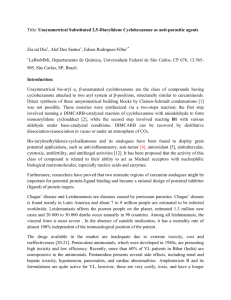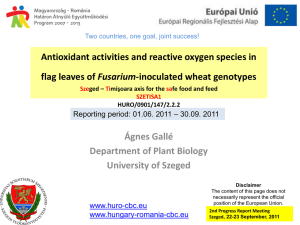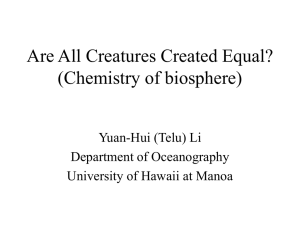Banskota AH, Tezuka Y, Tran KQ, Tanaka K, Saiki I
advertisement
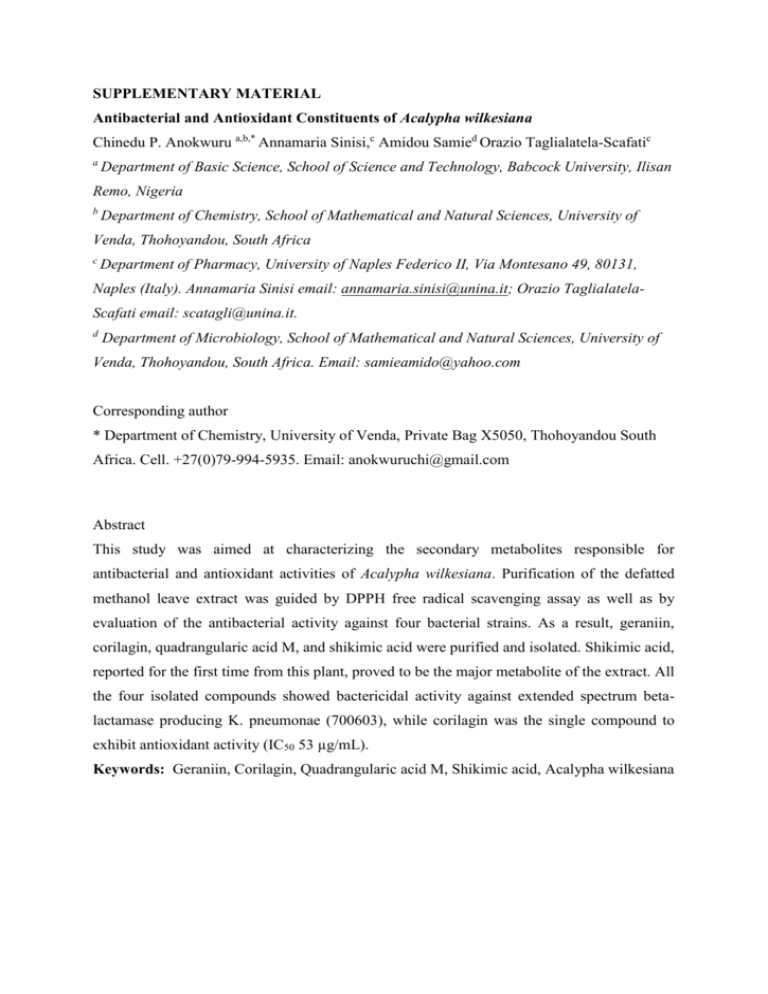
SUPPLEMENTARY MATERIAL Antibacterial and Antioxidant Constituents of Acalypha wilkesiana Chinedu P. Anokwuru a,b,* Annamaria Sinisi,c Amidou Samied Orazio Taglialatela-Scafatic a Department of Basic Science, School of Science and Technology, Babcock University, Ilisan Remo, Nigeria b Department of Chemistry, School of Mathematical and Natural Sciences, University of Venda, Thohoyandou, South Africa c Department of Pharmacy, University of Naples Federico II, Via Montesano 49, 80131, Naples (Italy). Annamaria Sinisi email: annamaria.sinisi@unina.it; Orazio TaglialatelaScafati email: scatagli@unina.it. d Department of Microbiology, School of Mathematical and Natural Sciences, University of Venda, Thohoyandou, South Africa. Email: samieamido@yahoo.com Corresponding author * Department of Chemistry, University of Venda, Private Bag X5050, Thohoyandou South Africa. Cell. +27(0)79-994-5935. Email: anokwuruchi@gmail.com Abstract This study was aimed at characterizing the secondary metabolites responsible for antibacterial and antioxidant activities of Acalypha wilkesiana. Purification of the defatted methanol leave extract was guided by DPPH free radical scavenging assay as well as by evaluation of the antibacterial activity against four bacterial strains. As a result, geraniin, corilagin, quadrangularic acid M, and shikimic acid were purified and isolated. Shikimic acid, reported for the first time from this plant, proved to be the major metabolite of the extract. All the four isolated compounds showed bactericidal activity against extended spectrum betalactamase producing K. pneumonae (700603), while corilagin was the single compound to exhibit antioxidant activity (IC50 53 µg/mL). Keywords: Geraniin, Corilagin, Quadrangularic acid M, Shikimic acid, Acalypha wilkesiana Experimental Plant material Fresh leaves of A. wilkesiana were collected in September 2010 at Babcock University horticulture garden and were identified by Prof. E. B Esan of the Department of Biosciences and Biotechnology, Babcock University (Nigeria). A voucher specimen has been deposited at the University Herbarium with the number BUH002. The leaves were air dried and ground to powder. Extraction In our previous study (Anokwuru et al. 2012) the detailed extraction procedure and percentage yield of defatted A.wilkesiana has been reported. Isolation The bioactive methanol extract obtained from defatted dried leaves of A. wilkesiana was fractionated by medium pressure column chromatography (MPLC) performed on a Büchi apparatus on silica gel (230-400 mesh particles) and using a gradient of eluents going from nhexane/EtOAc 9:1 to EtOAc to MeOH, affording twenty fractions which were tested for antimicrobial and antioxidant activities. Selected bioactive fractions were further purified by HPLC on a Knauer apparatus equipped with a refractive index detector and LUNA (Phenomenex) SI60 or RP18 (250 × 4 mm) columns. In particular, MPLC fractions eluted with EtOAc/MeOH 8:2 were further purified by HPLC on RP18 column (MeOH/H2O 85:15) to yield geraniin (18.4 mg [0.037% of plant sample], Compound 1) and corilagin (22.5 mg [0.045% of plant sample], Compound 2). Fractions eluted with EtOAc/MeOH 95:5 were further purified by HPLC on RP18 column (MeOH/H2O 85:15) to give quadrangularic acid M (3.5 mg [0.007% of plant sample], Compound 4). Fractions eluted with EtOAc/MeOH 9:1 proved to contain pure shikimic acid (210.2 mg [0.42% of plant sample], Compound 3) and needed no further purification. These compounds were identified on the basis of their NMR data, measured on a Varian INOVA spectrometer [1H (500 MHz) and 13C (125 MHz) NMR], and low and high resolution ESIMS spectra, obtained on a LTQ Orbitrap (Thermo Scientific) mass spectrometer. Spectral data were compared with those reported in the literature for each compound: geraniin (Gohar et al. 2003); corilagin (Thitilertdecha et al. 2010); shikimic acid (Zhang et al. 2007); quadrangularic acid M (Banskota et al. 2000). Figure S1 reports the 1H NMR spectrum of shikimic acid. Antibacterial activity The isolated compounds were tested against four bacterial species. These included two Gram positive bacterial strains: Staphylococcus aureus, one MRSA 25923 and one MSSA 33591 and two Gram negative bacteria: beta lactamase producing Escherichia coli 35218 and extended spectrum beta lactamase producing Klebsiella pneumoniae 700603. The antibacterial activity of the pure compounds was tested using the microdilution method according to Samie et al. (2005). Antioxidant activity The antioxidant activity of these pure compounds was determined using a modified DPPH (2, 2-diphenyl-1-picrylhydrazyl) free radical scavenging activity according to the method described by Boulanouar et al. (2013). Statistical analysis The antioxidant test was a mean of triplicate data. Student t-test was used to determine the significant difference (P<0.05) in the antioxidant assay. Figure S1. 1H NMR spectrum (CD3OD) of shikimic acid References Anokwuru CP, Adaramola FB, Akinrinbola D, Fagbemi E, Onikoyi F. 2012. Antioxidant and anti-denaturing activities of defatted and non-defatted methanolic extracts of three medicinal plants in Nigeria. Research 4: 56-62. Banskota AH, Tezuka Y, Tran KQ, Tanaka K, Saiki I, Kadota S. 2000. Thirteen novel cycloartane-type triterpenes from Combretum quadrangulare. J. Nat. Prod. 63: 5764. Boulanouar B, Abdelaziz G, Aazza S, Gago C, Miguel MG. 2013. Antioxidant activities of eight Algerian plant extracts and two essential oils. Ind. Crops Prod. 46: 85-96. Gohar AA, Lahloub MF, Niwa M. 2003. Antibacterial polyphenol from Erodium glaucophyllum. Zeitschrift Fur Naturforschung C 58: 670-4. Samie A, Obi CL, Bessong PO, Namrita L. 2005. Activity profiles of 14 selected medicinal plants from rural Venda communities in South Africa against 15 clinical bacterial species. Afr. J. Biotechnol. 4: 1443-51. Thitilertdecha N, Teerawutgulrag A, Kilburn JD, Rakariyatham N. 2010. Identification of major phenolic compounds from Nephelium lappaceum L. and their antioxidant activities. Molecules 15: 1453-65. Zhang P, Huang J, Chen F. (2007). NMR studies of a series of Shikimic Acid Derivatives. J. Chin. Chem. Soc. 54: 1313-20.
